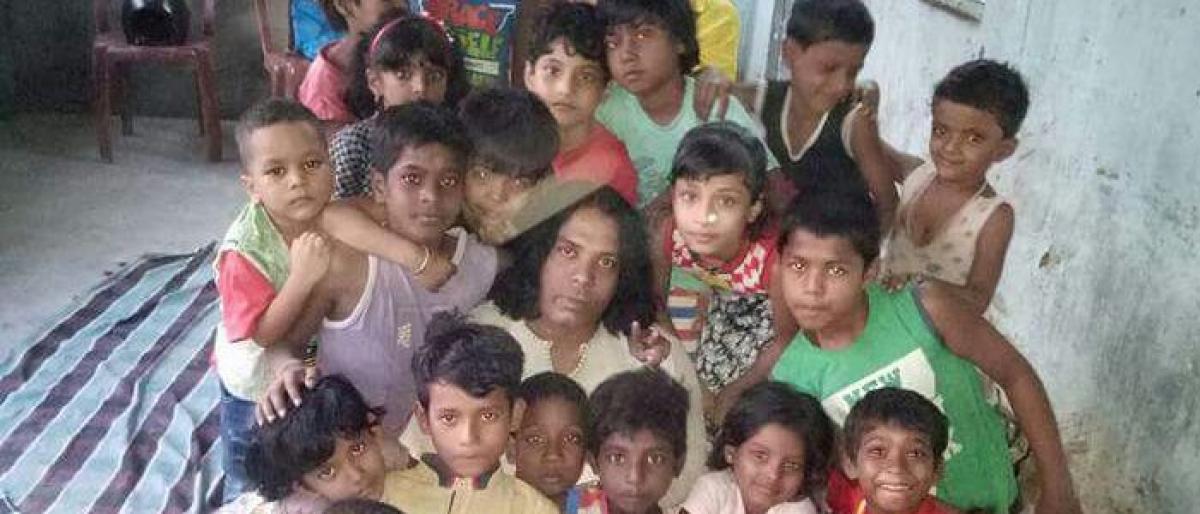Live
- A blend of science, spirituality and literature
- Speed walking pace can prevent metabolic diseases
- IIT Bombay hosts stellar academic research at ATMAN 2.0
- Studying abroad: A path to becoming a changemaker
- HC permits KTR to appear before ACB along with advocate today
- An icon of excellence in archery for nexgen
- 6 killed in Tirupati devotees stampede
- Green Hydrogen Hub set to create 57K jobs
- CWC seeks details on AP’s Godavari-Banakacharla linkage project
- A Towering Leader
Just In

Motherhood transcends gender. Unconditional love knows no caste barriers. Defying norms, in a rundown neighbourhood in Malda in West Bengal, transwoman Arindam Saha Kundu (now known as Priyanka) and her fellow transgender friends (Abhijit Nag and Bapon Jemadar) are busy imparting education to more than 40 children belonging to the Dalit community that is largely engaged in manual scavenging.
Motherhood transcends gender. Unconditional love knows no caste barriers. Defying norms, in a rundown neighbourhood in Malda in West Bengal, transwoman Arindam Saha Kundu (now known as Priyanka) and her fellow transgender friends (Abhijit Nag and Bapon Jemadar) are busy imparting education to more than 40 children belonging to the Dalit community that is largely engaged in manual scavenging.
Known for its juicy mangoes, Malda district has a high percentage of children not attending school, as documented in the book ‘Dalits and Tribes of India’ (a compilation of Papers presented at a three-day National Seminar on "Agenda for Emancipation and Empowerment of Dalits and Tribes"). Children from the scheduled communities are even less likely to do so. The railway colony in Malda town harbours the Dalit community.
Choosing to look beyond their own share of problems (discriminated for their gender), Priyanka and the rest, hailing from the town itself, decided to be a ray of hope to the marginalised kids, who lose much of their childhood to manual scavenging, gambling and drugs.
"Although it is 2017, people still treat the Dalit community as untouchables. The children suffer as the impoverished families are not able to afford education and often take their wards along while doing manual scavenging, cleaning tasks, etc. We wanted to do something for them," Priyanka said.
She also wanted to give in to her maternal instincts. "By soul we are women and so there is a deep yearning to be a mother. Since we can't do that, this is the closest possible; we can be with children and help them find their way," said Priyanka, a commerce graduate.
So in June, "Sapno Ki Udaan" under the Gour Bangla Sanghati Samiti took wings in a room of a local club. Ranging from the primary to middle school levels, the children, mostly dropouts, have only had snatches of education. "Some children know the alphabet, some don't. So the challenge was to customise the lessons. We are providing them lessons in basic science, maths, English, etc. The idea is to get them up to scratch so they can go back to schools," Priyanka explained. The beginning was shaky.
"The children were friendly with us. So we didn't have much issues with them, but their parents were reluctant. It was not just that we were transgender, it was also the fact that they didn't feel educating their children would be of much help," Priyanka explained.
The idea was galvanised into action with the help of Bapon, a transgender from the Dalit community. He helped convince the parents to let the children come each evening to the school."In addition, we wanted to break stereotypes. There are taboos associated with our community and we wanted to show the other side."
Salaries are supported through crowdfunding. "There is no fixed salary. Whatever comes, we are fine with that. If we do any social work for some gain, then it's not social work. We want funding to run the school," said Priyanka.
According to Abhay Kumar Roy, a lecturer in Malda College's department of English, who also supports the group in academic ways, the fact that the transgender community members chose to look beyond their own problems and work for the disadvantaged speaks a lot about what can be achieved if alternative gender identities are recognised.
"In ancient India, there were 20 to 25 gender identities which are not explored today. The transgenders have to accept themselves and have to rise up to the occasion and we have to support them in that for an inclusive society," Roy, who researches on pluralistic interpretation of mythology, said.

© 2024 Hyderabad Media House Limited/The Hans India. All rights reserved. Powered by hocalwire.com







